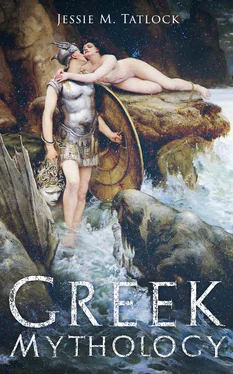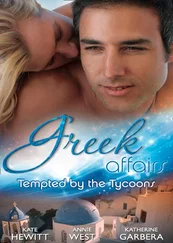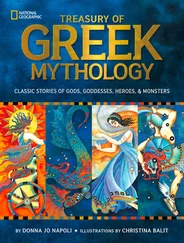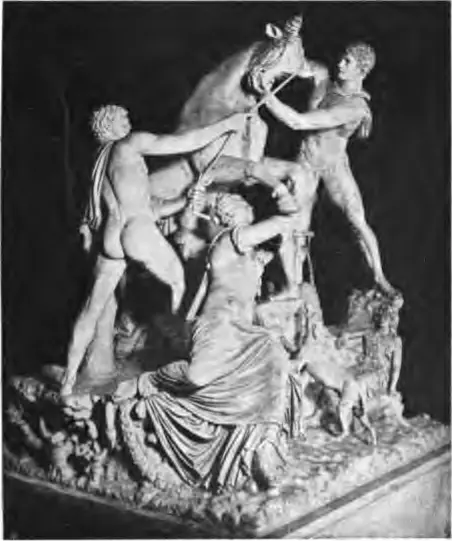
Fig. 4. Dirce tied to the bull.
The story of Baucis and Phi le’mon shows how Zeus could reward those who respected the law of hospitality and punish those who violated it.
In a certain place where now is a marsh frequented by wild birds was once a village. Here Zeus came in the guise of a mortal, and with him his son Hermes, winged sandals laid aside. They went to a thousand dwellings seeking rest and refreshment; all were barred against them. Yet one, a little house thatched with reeds, received them. Here good old Baucis and her husband Philemon had grown old together, making happiness even out of their poverty by bearing it together with contented hearts. Here then came the Immortals, and bending down their heads entered the low door. The old man placed a seat and bade them sit down, while Baucis bustled to throw over it a coarse covering. Then she gathered together the dying embers, added dry leaves and fuel and blew it into a flame with her feeble breath. Her husband brought in a cabbage from the little garden, cut a fat piece from the long-cherished flitch of bacon, and put them over the fire to cook. They shook up their cushion of soft sedge-grass, laid it on the dining-couch, and put over it a covering that, poor and patched though it was, they used only on great festivals. While the gods reclined on the couch, the trembling old woman, with skirts tucked up, set out the table. One foot of the table was uneven; a brick steadied it, and a handful of greens cleaned off the top. The feast began with olives, stewed berries, endive, radishes, cottage-cheese, and eggs carefully fried, all served in earthenware dishes. After this the mixing-bowl and cups, made of beech-wood lined with smooth wax, were set out for the wine — not rich old wine, but the best they had. There were nuts, figs, dried dates, plums, and fragrant apples served in baskets, and purple grapes gathered from the vines, and in the fiddle of the table the honey-comb. Above all there were cordial looks and eager good-will. And now the astonished couple began to notice that the mixing-bowl, as often as it was emptied, filled up again of its own accord. They trembled, and holding out their hands in supplication, asked forgiveness for the humble fare. There was one single goose, the guardian of the little farm; this its masters now prepared to slaughter for their divine guests. It escaped them, and flapping its wings, dodged about the little room and at last took refuge at the feet of the gods. The Immortals forbade its slaughter. "We are gods," said they, "and while this neighborhood pays the penalty for its inhospitality, you shall be free from misfortune. Leave your house and follow us." The two old people obeyed and, hobbling along with their sticks, climbed the hill. When a little way from the top, they looked back and saw all the village covered by a marsh; only their own house was left. While they wondered and bewailed their neighbors' fate, that little old hut of theirs was transformed. In place of the forked sticks supporting a roof thatched with reeds, rose marble columns crowned with gilded beams; the doors were of embossed metal, and the pavement of marble. Then the son of Cronus spoke: " Ask, righteous old man" and worthy woman, what you will." Philemon consulted a moment with Baucis and then answered: "We ask to be priests and to keep your shrines; and since we have lived happily together, let the same hour take us both, and let me never see the grave of my wife nor have to be buried by her hands." Their prayer was granted; they were guardians of the temple as long as they lived. One day as they stood side by side before the temple each saw a change come over the other. Now their forms, bent with age, grew straight and strong and rooted firmly in the earth. Then as the waving tree-tops grew over their heads, each said: "Farewell, O Wife! O Husband!" and then the bark covered their mouths. And so, in after years, the shepherds pointed out the oak and the linden growing side by side, and said: "The gods care for the godly, and protect those who do them service."
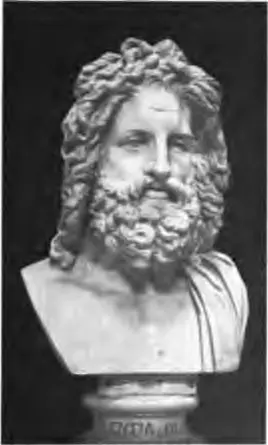
Fig. 5. Head of Zeus.
Zeus was represented in art as a man of generous build and majestic bearing, usually draped from the waist down. His head was massive, his brows heavy, his hair and beard extremely thick, as though his face looked out from masses of piled thunder-clouds. Beneath his overhanging eyebrows gleamed those eyes whose glance was lightning, and the heavily lined forehead foreboded that frown at which the heavens shook. His whole appearance was that of the majestic and powerful god of heaven and earth. He was generally represented as seated upon a throne, holding in one hand his scepter or a spear, and in the other his weapons, the winged thunderbolts. With him often appeared the eagle, the bird that by his bold heavenward flight and lightning-descent upon his prey was associated with the sky-god. On his scepter or beside him appeared a winged female figure, Victory, for he held the balances of fate and gave victory to this or that warrior as he willed. Among the Greeks themselves the statue most admired was that of gold and ivory set up in the temple at Olympia, in southern Greece. Before this representation of the greatest of their gods, Greeks from all parts of the Hellenic world met once in every four years to offer sacrifice and to compete in athletic contests, honoring their divinity by the exhibition of perfect bodies under perfect control. So great was the honor paid to successful contestants that the most famous lyric poets of Greece devoted their genius to celebrating them in hymns, which were sung by choruses to the accompaniment of the lyre or flute when the victors returned to their own cities in triumphal state. Moreover, the greatest sculptors joined to do them honor; for the proudest glory of an Olympic victor was the right he gained of having his statue set up in the precinct of the god. As one walks now through the ruins at Olympia, here he can make out the plan of the palestra in whose wide spaces Greek youth wrestled, ran races, rivaled one another in throwing the discus. Here was the long colonnade or stoa beneath whose shade poets read their works; in front, long rows of statues of youths, nude as they appeared when winning their victories. Here was the line of treasuries of all the states of Greece, and in the center, even now impressive for the great drums of its columns, fallen and piled in confusion by the earthquakes of centuries, rise the high foundations of the great temple of Olympian Zeus.
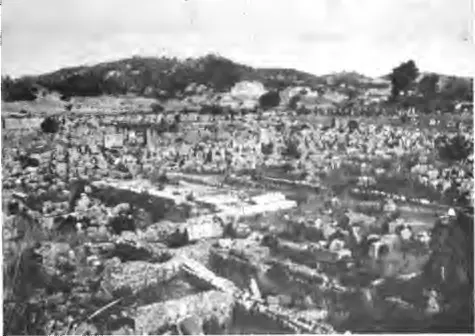
Fig. 6. View of ruins at Olympia.
At Do do'na, in Epirus, was a famous oracle of Zeus, one of the oldest holy places in all Greece. Here the priestess read the will of the god from the sound of the rustling leaves of the great oak, a tree especially sacred to Zeus. In every part of the Greek world were places set apart for his worship, and each state claimed his favor for some special reason. As late as early Christian times in Crete the grave of Zeus was pointed out, for conceptions of immortal gods were strangely combined with thoughts of death.
Zeus was identified by the Romans with their old Latin god, Jupiter or Jove, and the stories told of the one were transferred to the other. Jupiter was originally a sky-god, as Zeus was, and king of gods and men. Temples in his honor crowned many high hills in Italy, and he was called upon to send rain in time of drought. On the Alban Mount the temple of Jupiter Latiaris was the religious center of the Latin Confederacy. Jupiter Optimus Maximus was worshiped on the Capitoline Hill at Rome as guardian of the state and giver of victory in war, and to him generals returning victorious to celebrate a triumph offered the best of the spoils of war. Like Zeus, the Roman Jupiter was protector of right and truth and the sanctity of oaths.
Читать дальше
